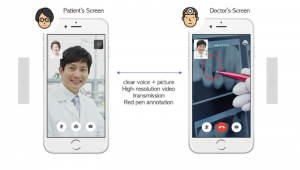

“When diagnoses are confined to the hospital, it’s inconvenient for the doctors and the patients. Doctors end up feeling stuck putting such long hours in at their office, and patients frequently break appointments because they can’t reach the clinic in time,” said Dr. Paul Oh. “With MDsquare, doctors and patients can be connected on their own terms.”
The MDsquare app
MDsquare is launching at a time when telemedicine is attracting attention. According to a 2017 study (by Grand View Research), the global telemedicine industry will have an expected market worth of $111B by 2025. (This study has predicted telemedicine will become particularly lucrative in the Asia Pacific region due to a booming IT industry, economic reforms and low operating costs.)
The MDsquare app works on both iOS and Android. Its promise is to provide patients with easy, affordable and secure access to doctors and specialists, no matter where they are. This presents three potential advantages:
- peace of mind for families traveling
- access for patients to consult with experts in rare diseases, without the added burden of travel
- a means to control the extremely high medical costs that apply in some countries.
Built on the Ethereum platform, MDsquare uses smart contracts. These enable patients to make one payment which automatically pays out to all who are involved in a consultation or treatment, for example:
- caregivers
- support staff
- the physician(s)
- interpreters (when necessary).
If the physician requests lifestyle data, say from a fitness wearable, the IoT device manufacturer makes this sharable. Furthermore, being on a blockchain enables the sharing of encrypted medical files – and, optionally, the patient can sell anonymize medical data directly to medical research companies.
TMED tokens
The TMED tokens for sales in July will become available on cryptocurrency exchanges. But to protect patients and doctors against the fluctuations of the volatile crypto marketplace, all payments for MDsquare services will be made with MD Points (MDP), a secondary non-crypto token which will be purchasable for a set US$ rate from the MDsquare website or via the MDSquare app. Customers will be able to:
- purchase MDP with fiat currency or TMED
- exchange it for TMED at the going rate.
Enterprise Times: what does this mean
Telemedicine is taking hold in the US, where there are not only punitively high health care costs but large numbers of Asians living there.
Yet research into the viability of telemedicine services, while ongoing, has yet to confirm initially promising results. The dilemma for patients will be deciding whether telemedicine is appropriate for their specific health problem(s). Its attraction, in the US especially, may derive from monetary considerations combined with the desire to obtain second opinions at reasonable cost, especially in the case of rare conditions.
The competition is ‘travel medicine’ – where patients visit a different country (like India) for specific operations or consultation. The advantage this has is personal contact. For those in Europe who think this fanciful, Enterprise Times talked with one doctor in Cyprus who told of a UK patent who visited the island for a week’s holiday in the sun each year plus have a full set of annual tests and x-rays for less than the private consultation cost in the UK, and whenever she chose.
All the above said, it would seem MDsquare’s use of blockchain has less to do with ‘medical function’ and more to do with financial practicality (for both the company and for patients). The use of token runs the risk of introducing a different uncertainty.
























